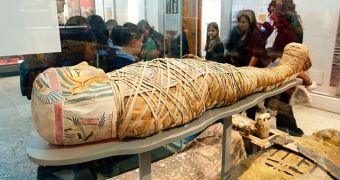Egyptologists at the British Museum have examined a series of ancient mummies and uncovered some unexpected secrets which have literally been kept under wraps until now. Eight ancient mummies of Egypt underwent CAT scans at London hospitals, and scientists discovered a tattoo of a man's name on the inner thigh of a 1300-year-old mummy.
Totally wrapped in bandages and often considered figures of terror, Egypt's mummies have long captivated archaeologists and normal people alike. Now, eight mummies are on display at the British Museum in a new exhibition, disclosing the human side of the mummies of the Nile.
“We want to promote the idea these are not objects, but real human beings. We want to capture the humanity of these people,” said John Taylor, head curator of the British Museum's Ancient Egypt and Sudan department, according to Daily Mail.
The preserved body of an ancient Sudanese woman who is thought to have died about 700 AD reveals an unexpected detail: a symbol tattooed on the skin of her right leg.
The tattoo is actually a monogram that spells out the ancient Greek characters M-I-X-A-H-A, which translates as Michael. It is believed that the ink is a religious symbol representing the Archangel Michael, the patron saint of medieval Sudan.
The biblical figure appears in the New Testament as a protector and leader of God's armies against the evil forces of Satan. This protective symbol has previously been found in ancient churches and on stone tablets, but never before in the form of a tattoo.
“You can see her tattoo really clearly using infra-red reflectography. She is the first evidence of a tattoo from this period. This is a very rare find,” said exhibition curator Daniel Antoine.
The female corpse, aged between 20 and 35, was found in Sudan in 2005.
The mummies that form part of the new exhibition come from different eras and different social layers, from royalty to ordinary people. The oldest body tested by researchers is more than 5,500 years old and dates back to 3,500 BC, while the most recent lived around 1,300 years ago.
Using scientific techniques such as computer tomography, researchers were able to determine that ancient Egyptians suffered from the same health problems as modern people, including high cholesterol, fatty diets, heart problems and bad toothache.
The exhibition, called “Ancient Lives: New Discoveries,” opens on May 22 and reveals new details about ancient people's existence.

 14 DAY TRIAL //
14 DAY TRIAL //